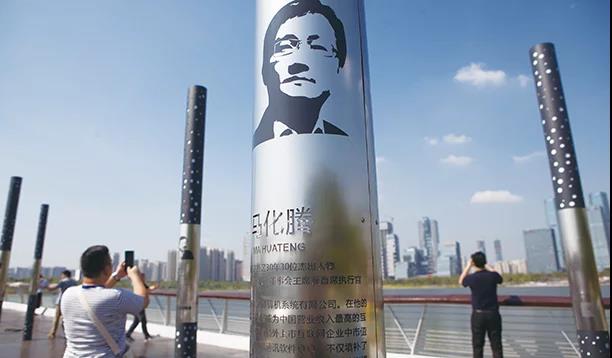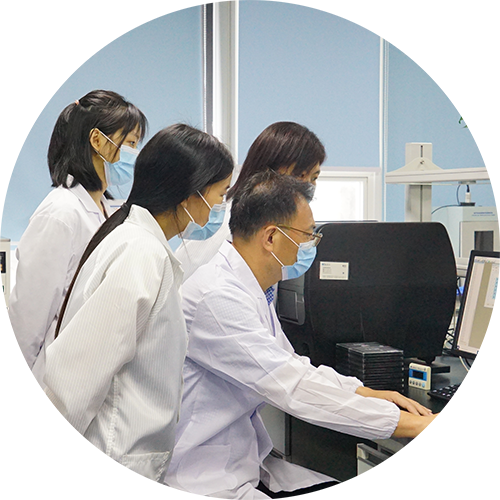News
Shenzhen grants 28.4 million yuan of start-up subsidies to overseas returnees, among which the top four are all biopharmaceutical companies
2017-11-21 Views:

The Time Weekly reporter Xie Yiguan from Shenzhen
Walking into TargetRx Inc. (hereinafter referred to as TargetRx) located in Shenzhen Nanshan Kexing Science Park, there are four laboratories on both sides of the aisle, and expensive instruments are placed in the laboratories.
“The purchase of instruments costs a lot, and most of this subsidy is spent on the equipment.” Yihan Wang, chairman of TargetRx, told to the reporter of The Time Weekly. The subsidy mentioned by Yihan Wang refers to that for the initial start-up expenses of overseas students.
On November 3, according to the official website of the Shenzhen Municipal Bureau of Human Resources and Social Security, Shenzhen will provide a total of 28.4 million yuan of subsidies for the initial start-up expenses of overseas students, and a total of 64 enterprises founded to be eligible by overseas. Among them, 10 enterprises founded by overseas students including TargetRx received first-class funding, 1 million yuan each.
As one of the entrepreneurial support policies, this subsidy aims to solve the problem of “difficult start-up” for overseas students to start a business. According to incomplete statistics from the reporter of The Time Weekly, a total of 107.45 million yuan has been distributed since the implementation of the subsidy policy in 2011, and enterprises such as Novocare and Lifotronic Technology are all on the list.
“TargetRx was established in 2014. As a start-up company, the need for funds is more urgent than other companies, especially for pharmaceutical companies, which have a long payback period and high R&D costs, this funding provides a great help.” Yihan Wang told the reporter of The Time Weekly.
The whole process only took two months
Unlike previous subsidies, this subsidy is gratuitous. After the list is publicized, the subsidy will be distributed to the funded enterprise in a lump-sum form into the regulated account opened by the depositary bank determined by the municipal government.
“Some of the fundings we previously received have requirements on the scope of application. The requirements of this funding are not strict and it can be more widely used than other fundings.” Yihan Wang told the reporter of The Time Weekly, “It is worth mentioning that the government departments are also very efficient this time. It took up to two months from the notification to the application then to the final defense and selection, which is faster than the other funding applications.”
A staff of the Human Resources and Social Security Bureau of Shenzhen told the reporter of The Time Weekly, “There is no clear regulation on the use of the subsidy this time. We will contact the company to sign the contract after the publicity of the list is over, and then go through the allotment procedures at one time.”
For many years, returnees have been the focus of Shenzhen's talent introduction. According to data from the Human Resources and Social Security Bureau of Shenzhen, as of the end of October 2017, the city has introduced 14,800 overseas students. Over the past 17 years since the introduction of returnees, more than 90,000 overseas students have been introduced, and the total number of the companies founded by the overseas students has reached more than 4,200.
Among them, the proportion of returnees who chose to start a business is not small. On February 7 this year, the Human Resources and Social Security Bureau of Shenzhen released the Analysis Report on the Introduction of Overseas Students in Shenzhen in 2016, showing that 1,103 overseas students chose to start a business, accounting for 10.5%, with a year-on-year increase of 46.9%.
Yihan Wang said, “China is developing rapidly, and the atmosphere for innovation and entrepreneurship is very good, allowing people studying and working abroad to see opportunities to develop their expertise. Regarding to the biopharmaceutical industry I am engaged in, there is a big gap between China and the United States. With the idea of allowing domestic patients to take advanced and affordable drugs and catching up with the level of medication in the United States as soon as possible, I returned to China to start a pharmaceutical company.”
In an interview with the media, the person in charge of the Human Resources and Social Security Bureau of Shenzhen believed that Shenzhen’s investment development and living environment have become more attractive to overseas students, the Peacock Project, the start-up expense subsidies for overseas students’ entrepreneurship, and other talent policies, as well as the China International Talent Exchange Conference, the China (Shenzhen) Innovation & Entrepreneurship International Competition and other actives have further played a positive role.
The top four are all biopharmaceutical companies
Thanks to the supportive policies of Shenzhen for so many years, a large number of key companies founded by overseas returnees, such as Netac and Xunlei, have become well-known companies in China and have a good momentum of development.
In a recent interview with the media, the person in charge of the Human Resources and Social Security Bureau of Shenzhen stated that the start-up cost subsidy for overseas students to start a business in Shenzhen has solved the problem of “difficult start-up” for overseas students to start a business in a timely manner, which attracted a large number of overseas students to carry out innovation and entrepreneurship in Shenzhen, accelerated the construction of the overseas student pioneer parks, and promoted the vigorous development of Shenzhen’s returnee economy.
Nycrist Pharmatech Limited is one of the companies that received the first-class funding this time. The relevant person in charge told the reporter of The Time Weekly, “The biopharmaceutical industry has a long cycle and high requirements for technology and quality. We are a team composed of overseas returnees and foreign experts. Foreign experts all moved to Shenzhen with their families. This subsidy can very well inspire team members, especially foreign experts, and let them feel the care and support they have received as a technical expert in starting a business in China.”
It is worth noting that the biopharmaceutical companies have taken a lot of weight in this funding. The top four in the first-class subsidy list are all from biopharmaceutical companies.
“The Shenzhen Municipal Government’s support for overseas talents, specifically in the pharmaceutical field, is a shortcoming, which will affect the development of the city. The top four in the subsidy list are all from biopharmaceutical companies, indicating that the Shenzhen Municipal Government is increasing investment in the pharmaceutical field to promote the development of the pharmaceutical industry.” Yihan Wang told the reporter of The Time Weekly.
n recent years, the government has attached great importance to the work of overseas talents, from the implementation of the mid- and long-term talent development plan, to the Opinions on Strengthening the High-Level Talents Team Construction in Shenzhen and 6 supporting policies, the “Peacock Plan”, plus the “talent settlement”, industrial development and innovation talent awards, and the start-up expense subsidies for overseas students to start a business and other talent incentive guarantee policies, the Shenzhen talent policies are becoming more and more perfect, and the intensity of innovation is constantly increasing.
As early as 2001, Shenzhen promulgated the Measures for the Management of Subsidy Funds for Early-stage Start-up Costs for Overseas Students in Shenzhen, which arranges 10 million yuan as a subsidy fund every year for the early-stage start-up expenses of overseas students to start their own businesses in Shenzhen and the construction of the innovation and development environment for overseas students’ enterprises. Since September 2016, the newly revised measures have been implemented, and the funding standard has been doubled.
In the Measures to Promote the Priority of Talent Development issued by the Shenzhen Municipal Party Committee and Municipal Government in March last year, it is required to improve the subsidy policy for overseas students who come to Shenzhen to start their own businesses. Those who come to Shenzhen to start their own businesses will be given 300,000 to 1 million yuan for entrepreneurship. Special outstanding projects will be funded up to 5 million yuan.
Besides money, there are other difficulties
According to the official website of the Shenzhen Municipal Government, as of the end of 2016, Shenzhen had built 22 overseas student pioneer parks, and 8 industrial parks, with a total incubation area of 8.72 million square meters, and there are 60 companies founded by overseas students achieved an annual output value of over 100 million yuan.
However, there are also many problems that need to be solved urgently for the returnees to return China to start their own businesses.
At the 2017 Inter-Ministerial Joint Meeting on the Service Work for Overseas Students Returning to China held on April 11, Tao Tang, the Deputy Minister of the Ministry of Human Resources and Social Security of China, said that in 2017, the service work for overseas students returning to China should solve the six difficulties (referring to difficulty in enjoying preferential policies, handling household registration and education, opening an account and financing, applying intellectual property rights, liberalizing policy restrictions, and integrating cultural concepts encountered by returned overseas students in entrepreneurship and innovation), and provide talent support for the promotion of innovation-driven development strategies.
The reporter learned from the official website of the Shenzhen Municipal Government that, in the future, Shenzhen will further relax foreign investment access, enhance the introduction of investment, technology and intelligence, and improve the quality of foreign investment utilization. High-level foreign talents who hold foreign permanent residence permits to set up high-tech enterprises will be given equal treatment to citizens. Provide convenience for foreign high-level talents and their foreign spouses and children who come to Shenzhen for entrepreneurship and innovation in accordance with laws and regulations.
“The next step for the government is to reduce the cost of entrepreneurial talents to settle down accordingly; secondly, to appropriately let go of enterprises so that they can accept the baptism of the market; and finally, to continue to increase their efforts to attract overseas talents to return from the forefront of foreign scientific and technological development.” Jian Zhong, Director of the China Center for Special Economic Zone Research of Shenzhen University, told the reporter of The Time Weekly.
Shenzhen has been selected as the Most Attractive Chinese City in the Eyes of Foreign Talents sponsored by the State Administration of Foreign Experts Affairs for 7 consecutive years. Among the 18 indicators, Shenzhen has the highest score for entrepreneurial support policies. As the only Chinese Cities List in China that is selected by foreigners, this list is full of value.
The content on this website (including but not limited to text, pictures, audio and video), except for reprinting, are all copyrights of Times Online. Reprinting, linking, reposting, or other use is prohibited without the authorization of a written agreement. Anyone who violates the above statement will be held accountable by this website. For other media, websites or personal use, please contact Mr. Ding on this website: chiding@time-weekly.com
Special statement: This article was uploaded and published by the author of NetEase's self-media platform "NetEase", and only represents the author's views. NetEase only provides an information release platform.







 Tel: +86-0755-86934300
Tel: +86-0755-86934300 3rd Floor, Building A1, Kexing Science Park, No. 15 Keyuan Rd., Nanshan District, Shenzhen, China
3rd Floor, Building A1, Kexing Science Park, No. 15 Keyuan Rd., Nanshan District, Shenzhen, China E-mail:
E-mail: 